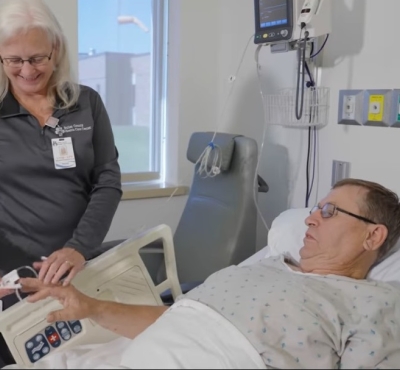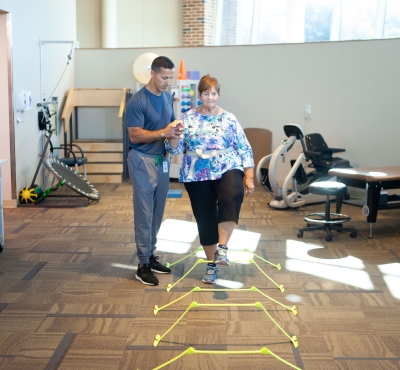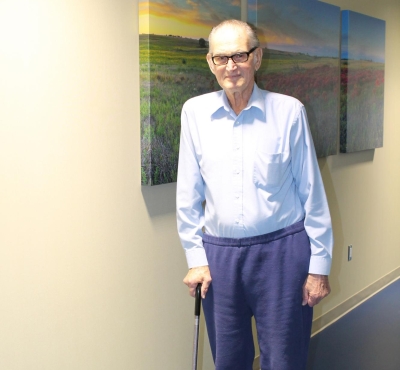At Butler County Health, we deliver the caliber of care synonymous with larger hospitals, while preserving the warmth, personalized attention and meticulousness of a smaller health care facility. This is the result of our extensive years of experience, rigorous staff training, and continuous integration of state-of-the-art technology. Our primary goal is to ensure you and your family’s experiences are marked by comfort and satisfaction throughout your health care journey.
Acute Care
The patient rooms at Butler County Health are all private patient rooms. The layout of the patient rooms are all designed to maximize patient safety and staff efficiency. Each patient room is carpeted and has a private bathroom with zero entry showers that can be used by the patient independently or with assistance from staff. Both of which reduce the risk of falls. There are computers installed at the head of each patient bed that allows nursing staff to use an electronic medication administration system that helps to minimize medication errors and it is used to electronically chart medical records.
Other ammonites available in the patient rooms to make your stay more comfortable are a flat screen television, sitting area for family and visitors with pull out couch and wireless internet service.
Transitional Rehabilitation Program
Butler County Health has participated in the Medicare Swing Bed Program since it was authorized in 1980. The Swing Bed Program name has always been a confusing term to patients. As a result, Butler County Health now refers to the Swing Bed Program as the Transitional Rehabilitation Program.
The Transitional Rehabilitation Program is the next step after an acute inpatient hospitalization and can be an alternative to skilled nursing home placement before a patient is ready to return home. The term “transitional rehabilitation” is used to describe the conversion of care that hospitalized patients receive once they are no longer in need of acute care. Transitional care admissions are reserved for patients who require some level of skilled nursing care and/or rehabilitation services, determined by their physician, such as occupational therapy, physical therapy, speech therapy, wound care or IV therapy to name a few. In order to qualify for transitional rehabilitation the patient must have a minimum of three inpatient overnight stays. At Butler County Health, the patient is not required to change rooms in the facility when a transition from acute care to transitional rehabilitation occurs and they will always be guaranteed a private room.
While acute care is designed to treat illness or injury, the Transitional Rehabilitation Program is designed to help patients recover and prepare for their return home. This ensures continuity of care for our patients as they receive care from the same nurses, doctors and therapists who provided care for them while in acute care at Butler County Health. This also provides the option for patients who have received acute care at another hospital, such as Bryan Health or UNMC, to return home to the Transitional Rehabilitation Program at Butler County Health to recover. Examples of individuals who may qualify for the Transitional Rehabilitation Program include, but are not limited to: recovery from an accident, injury, illness or surgery, recovery from a planned surgery (example: hip, knee, or shoulder replacement, back surgery), reconditioning after a lengthy hospitalization due to pneumonia, chronic obstructive pulmonary disease or other chronic conditions, stroke recovery, wound care, pain management or long-term IV therapy. It is the patient’s choice to decide if they receive skilled nursing care at Butler County Health or a nursing home. Patients who are receiving care at another hospital, such as Bryan Health or UNMC, can also receive skilled nursing care at Butler County Health by simply informing the hospital staff.
The Transitional Rehabilitation Program is not intended for permanent placement. The length of stay in the Transitional Rehabilitation Program is dependent upon each individual patient. Medicare does allow Transitional Rehabilitation Program stay for up to 100 days; however, most stays are less than 30 days. Eligibility in the Transitional Rehabilitation Program is evaluated on a constant basis, as the patient must be making progress in order to qualify for transitional rehabilitation status. The skilled nursing care provided by the Transitional Rehabilitation Program is generally paid for by Medicare or Medicaid or by private insurance carriers. Medicare will cover up to 20 days at 100% for skilled nursing care at the hospital. After the first 20 days, if the patient continues to qualify for skilled care services, they are responsible for daily coinsurance up to the 100th day, the same as in a nursing home facility. Sometimes patients may experience a break in care which may change their eligibility for coverage. For example, if a patient leaves the skilled services for less than 30 days and then needs to return to skilled care for the same medical condition, they will not need another 3 day hospital stay to be eligible for skilled care coverage. If the break lasts for 60 consecutive days, the skilled benefits will be renewed for transitional rehabilitation only if another 3 day hospital stay occurs.


